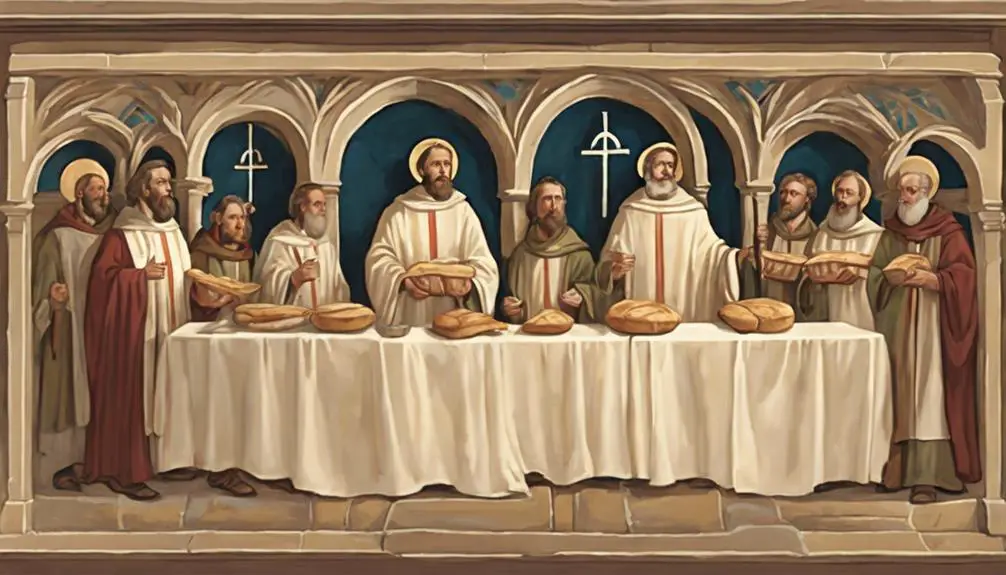Uncover the vital yet often overlooked role of Timon, a deacon in early Christianity, and his impact on the foundation of servant leadership.

Timon in the Bible
Imagine you're exploring the early Christian community and stumble upon the figure of Timon, one of the seven deacons chosen to assist the Apostles in Acts 6. You might not recognize his name immediately, as he's not as prominent as Stephen or Philip, but his role is pivotal.
Serving the widows and the needy, Timon exemplifies the essence of servant leadership in the fledgling church. Unpacking his story not only shines a light on his contributions but also invites you to reflect on the broader implications of service and leadership in faith communities.
What could his understated yet critical role reveal about the values and priorities of early Christianity?
Key Takeaways
- Timon, a deacon, played a crucial role in early Christian community service and leadership.
- His Hellenistic Jewish background helped bridge cultural gaps within the early church.
- Selection as a deacon emphasized his spiritual maturity, wisdom, and dedication to Jesus' teachings.
- Timon's legacy sets a foundational example for Christian service and leadership through action.
Who Was Timon?

Timon, one of the seven deacons chosen by the early Christian community, played a crucial role in the church's mission to distribute aid and share the gospel. Delve into Timon's origin, and it becomes evident that the Scriptural account offers scant details about his background. However, scholars infer that, like the other deacons, Timon was likely of Hellenistic Jewish descent, indicating a blend of Jewish faith and Greek culture. This bicultural background positioned him well to address the needs and mediate between the Hellenistic and Hebraic members of the early church, showcasing an essential aspect of his character traits.
Analyzing Timon's character traits, it's clear that he embodied the qualities of a dedicated and compassionate servant leader. His selection as one of the seven deacons underscores his reputation for wisdom and spirituality, traits highly esteemed in the nascent Christian community. Furthermore, his Greek name suggests a familiarity with Hellenistic culture, an advantage in the church's outreach efforts. Timon's dedication to service and his ability to bridge cultural divides highlight the indispensable role he played, not merely as a distributor of aid but as a unifier within the diverse early Christian community.
Timon's Role in Acts
In the Acts of the Apostles, a pivotal text within the New Testament, the narrative introduces us to the significant contributions made by Timon as one of the seven deacons. His role, deeply intertwined with the early Christian community's needs, showcases his dedication to serving those marginalized and in need, especially the Hellenistic Jewish Christians. Timon's ethnicity, presumably Hellenistic, is crucial in understanding his selection as a deacon. This background positioned him uniquely, enabling him to bridge cultural and linguistic gaps within the diverse early Christian community.
Timon's interactions with the Apostles underscore the trust and respect he garnered within the early Church. His appointment by the Apostles, detailed in Acts 6, wasn't merely administrative but deeply spiritual, reflecting the Apostles' acknowledgment of his faith and his capability to fulfill the Church's mission. This act of selection also indicates the Apostolic desire to ensure that the community's practical needs didn't overshadow their spiritual responsibilities.
Analyzing Timon's role allows us to appreciate the intricate balance of service, community, and faith in the early Christian narrative. Through his dedicated service, Timon exemplified the diaconal role's essence, serving as a vital link between the Apostolic leadership and the community's needs.
The Seven Deacons

Among the early Christian community's pivotal figures, the seven deacons stand out for their essential role in addressing the needs and ensuring the welfare of the Hellenistic Jewish Christians. These individuals weren't chosen at random; their selection was a thoughtful process reflecting the early church's governance and the high standards set for deacon qualifications.
- Spiritual Maturity: They'd to exhibit profound spiritual depth, showcasing an understanding and commitment that aligned with the teachings of Jesus Christ.
- Good Reputation: Their character was non-negotiable, requiring a reputation that spoke of integrity and moral uprightness within and beyond the community.
- Wisdom: They needed the capability to make judicious decisions, a trait that was critical in managing the community's resources and resolving disputes.
- Full of the Holy Spirit: This was perhaps the most crucial criterion, as being filled with the Holy Spirit was seen as essential for guiding their actions and decisions.
This meticulous selection process underscores the early church's commitment to ensure that those serving in these roles could genuinely meet the community's spiritual and physical needs, thereby setting a precedent for church governance that emphasized moral integrity, wisdom, and spiritual depth.
Significance of Timon's Service
As one of the seven deacons, Timon's contribution was instrumental in bridging the gap between the Hellenistic Jewish Christians and the wider community, ensuring their needs were met with unwavering commitment and empathy. His role exemplified notable leadership qualities, where he not only responded to the immediate needs of the community but also navigated the complexities of early Christian ministry with a profound spiritual dedication. This unique blend of practical service and spiritual leadership underscored the critical importance of the deacon's role in the nascent church, laying a foundation for future generations.
Timon's service went beyond mere administrative duties; it was a testament to the power of faith in action. His ability to serve with empathy and understanding highlighted the essence of Christian leadership – to lead by serving. This approach not only facilitated the growth of the early church but also set a precedent for how spiritual dedication can manifest in tangible acts of kindness and support. Through his actions, Timon demonstrated that leadership within the church isn't about wielding power but about empowering others, a principle that remains central to Christian leadership to this day.
Reflections on Timon's Legacy

Reflecting on Timon's legacy reveals a profound impact on the development of Christian leadership and service models. His story, rooted deeply in the Acts of the Apostles, serves as a cornerstone for understanding the early church's approach to service and community. Timon's motivations, primarily driven by a deep faith and commitment to spreading the Gospel, underline the essence of servant leadership in the Christian doctrine.
To fully grasp the legacy impact, consider the following:
- Introduction of Servant Leadership: Timon epitomized the concept of leading by serving, fundamentally shifting how leadership is perceived within Christian communities.
- Model for Deacons: His role set a precedent for the diaconate, emphasizing the importance of service, charity, and the Word in ministry.
- Community Building: Timon's efforts in serving widows and the needy provided a tangible blueprint for community support within the church, fostering a culture of care and inclusivity.
- Spiritual Inspiration: His dedication inspires countless Christians to pursue their faith with zeal, underlining the impact of personal conviction in spiritual leadership.
Analyzing Timon's motivations and the subsequent legacy impact, it's clear his contributions are immeasurable, shaping the fabric of Christian leadership and service for generations.
Frequently Asked Questions
How Does the Name 'Timon' Reflect His Cultural or Religious Background in the Context of the Bible?
You're diving into how names like Timon carry deep layers of cultural and religious symbolism, even when stripping away biblical context.
Analyzing Timon's etymology reveals insights into the cultural landscape of the time. It's not just a name; it's a reflection of societal values, beliefs, and possibly the role individuals played within their communities.
This approach lets you grasp the intricate tapestry of cultural identity, deeply woven with threads of religious and historical significance.
Are There Any Archaeological Findings or Historical Records Outside the Bible That Mention Timon or His Contributions to Early Christianity?
You're searching for signs of Timon beyond ancient texts, hoping for tangible connections. Yet, despite efforts, Timon's artifacts remain elusive, with no concrete documentary evidence of his contributions to early Christianity unearthed so far.
This absence challenges scholars, pushing them to rely on textual analysis and inferential connections to piece together his impact. The quest continues, blending archaeological ambition with scholarly rigor to illuminate this figure's historical footprint.
How Has Timon's Story Influenced Modern Christian Practices or Theological Interpretations?
You might wonder how Timon's influence stretches into modern Christian practices and theological interpretations, given the lack of direct mentions.
His story, though not frequently highlighted, subtly enriches the collective understanding of Christian service and compassion.
It's through examining figures like Timon that believers can glean insights into the early church's values, thereby shaping contemporary worship and community engagements.
This reflection encourages a deeper, more informed approach to living out faith today.
Can Parallels Be Drawn Between Timon's Role in the Bible and Similar Roles in Other Religious Texts or Traditions?
You can certainly draw parallels between roles in various religious texts and traditions, emphasizing the importance of comparative mythology and interfaith dialogues.
By analyzing these roles, you delve into the core values and teachings that span across cultures, offering a richer understanding of human spirituality.
This scholarly approach not only enriches your knowledge but also fosters respect and appreciation among different faith communities, highlighting universal themes of compassion, leadership, and service.
What Are Some of the Major Challenges Scholars Face When Trying to Verify the Historical Accuracy of Timon's Life and Deeds?
You're navigating a sea of ancient texts, where the waves of Textual Criticism and the winds of Manuscript Variability constantly shift. The major challenges you face include deciphering the original meaning amidst these changing conditions, distinguishing fact from fiction in scant historical records, and reconciling variations across different manuscripts.
Each step requires meticulous analysis, as you aim to piece together a coherent picture from fragments scattered through time and interpretation.
Conclusion
In conclusion, Timon's role as one of the seven deacons highlights the early Church's commitment to social justice and community service. By distributing food and aid, he exemplified the practical application of faith in action.
Consider a modern parallel: a community kitchen where volunteers, inspired by Timon's example, tirelessly serve the needy. This embodiment of service underscores the timeless relevance of Timon's legacy, demonstrating how ancient acts of charity inform and inspire contemporary efforts towards social equity and compassion.



Sign up